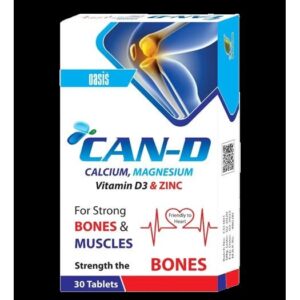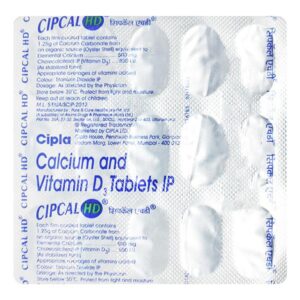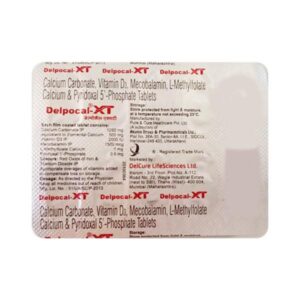CALCIUM CARBONATE + VITAMIN D3 (CHOLECALCIFEROL)
Calcium Carbonate: Calcium Carbonate is a medication that is commonly used as a dietary supplement to fulfill the body’s requirement of calcium. It is also prescribed to treat conditions like osteoporosis, osteomalacia, and hypoparathyroidism where there is a deficiency of calcium.
The primary mechanism of action of Calcium Carbonate is to increase the levels of calcium in the body. It does so by providing an additional source of calcium ions. Calcium is an essential mineral that plays a crucial role in various physiological processes like nerve transmission, muscle contraction, blood clotting, and bone formation.
The recommended dose of Calcium Carbonate varies depending on the individual’s age and the condition being treated. Generally, the daily dose for adults ranges from 500 to 1500 mg. It is always advised to consult a healthcare professional for the appropriate dosage based on your specific needs.
Although Calcium Carbonate is generally safe to use, it may lead to some side effects. Common side effects include constipation, bloating, gas, and stomach upset. In rare cases, excessive intake of Calcium Carbonate may cause hypercalcemia, which is characterized by symptoms like increased thirst, frequent urination, confusion, and muscle weakness. It is important to follow the recommended dosage to avoid these side effects.
It’s worth noting that Calcium Carbonate may interact with certain medications, such as tetracycline antibiotics, bisphosphonates, and levothyroxine. Therefore, it is important to inform your healthcare provider about all the medications you are currently taking to prevent any potential drug interactions.
Overall, Calcium Carbonate is a widely used medication to fulfill calcium requirements and treat calcium deficiency-related conditions. However, it is important to use it under the guidance of a healthcare professional and adhere to the recommended dosage to minimize the risk of side effects.
Vitamin D3 (cholecalciferol): Vitamin D3, also known as cholecalciferol, is a fat-soluble vitamin that is naturally produced in the skin when exposed to sunlight. It can also be obtained through certain dietary sources such as fatty fish, fortified dairy products, and supplements.
Vitamin D3 is primarily used to treat and prevent vitamin D deficiency. It is essential for maintaining healthy bones and teeth as it helps the body absorb calcium and phosphorus. Additionally, it plays a crucial role in supporting immune function, muscle strength, and cardiovascular health.
The mechanism of action of Vitamin D3 involves its conversion to its active form, calcitriol, in the liver and kidneys. Calcitriol then binds to vitamin D receptors in various tissues, regulating the expression of genes involved in calcium and phosphate metabolism.
The recommended daily dose of Vitamin D3 varies depending on age, sex, and specific medical conditions. For adults, the recommended daily allowance is around 600-800 IU (international units), with higher doses prescribed for individuals with severe deficiency. However, it is important to consult with a healthcare professional to determine the appropriate dosage for individual needs.
Most people tolerate Vitamin D3 well, but some potential side effects may occur, particularly with excessive doses. These side effects may include nausea, vomiting, constipation, weakness, headache, and increased thirst. Long-term excessive intake of Vitamin D3 can lead to hypercalcemia, a condition characterized by high levels of calcium in the blood, which can cause kidney stones, soft tissue calcification, and, rarely, cardiac arrhythmias.
It is worth noting that certain medical conditions and medications may interact with Vitamin D3, so it is important to inform your healthcare provider about any pre-existing conditions or medications you are taking before starting Vitamin D3 supplementation.
Overall, Vitamin D3 is a vital nutrient that plays a crucial role in maintaining overall health, especially bone health. It is widely available in dietary sources and supplements and is generally safe when taken in appropriate doses.




